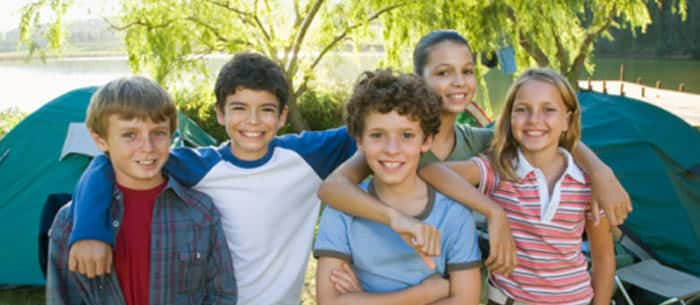Camp is a long-standing summer tradition for many families. It can be a life-changing experience for kids that will give them memories that last forever.
During the school year, kids spend most of their time in their seats. According to Peg Smith, CEO of the American Camp Association, “camp gives children the opportunity to actively engage with things. It’s not just about passing a test, it’s about exploring their world.”
Michael Thompson Ph.D. is an author and psychologist specializing in children and families. In his book, ” Homesick and Happy: How Time Away From Parents Can Help a Child Grow,” he demonstrates how summer camp be a healthy experience that will build a child’s self-esteem and give them the confidence to make decisions and be responsible for their actions throughout life.
Whether you send your child to day camp or sleep away camp, they will learn lessons that will make a lasting impression on your child well into adulthood.
If you need help with the camp process, read our article on 6 Steps to Starting the Camp Search. Then find a camp on Care.com.
-
Independence
“I think the single most important thing camp teaches children is to be independent,” says Karen Rosenbach, mother of twin girls from New York City. “They have to figure things out on their own, live with lots of other kids and make it work — invaluable life lessons.”While a majority of children who attend camp experience homesickness in some form or another, camp provides a safety net that allows them to navigate decision-making processes, discover likes and dislikes and gain the ability to become a confident, self-aware community member. “Growing up is painful and parents want to shield children from it,” says Dr. Thompson. “What parents don’t realize is that by protecting the child from the ups and downs of development, he or she will never learn the tools to become independent or the skills to face more challenging issues as he or she gets older.”
-
Appreciation
With that newfound sense of independence, your kids may even (gasp!) gain a sense of appreciation for you and all of the things you do that may have otherwise gone unnoticed. Now that your child has to make his bed, tidy his room and take turns doing different chores around camp with the other kids, it may dawn on him that you’re the one taking care of all this stuff at home. Hopefully, that realization leads to some gratitude for all the comforts home provides.According to Smith, many parents report that after camp their children come home more mature and more interested in family life. “They’re more willing to do chores and participate in conversations around the dining room table,” she says.
-
Identity
According to Dr. Thompson, there are limits to what parents should control. “At a certain point, you have to let your child step out and be in an environment where you don’t know the schedule or all of the other parents,” Dr. Thompson says.Camp is a place with little to no outside distractions — namely video games, phones, Facebook and life pressures. This opens the door for experiences your child might never discover staying home. Camp expands children’s minds and exposes them to people and activities that will ultimately help them decide who they are.
-
New Skills
Whether your child is attending Boy or Girl Scouts camp, math camp, soccer camp, etc., all camps teach kids a new set of skills that can be brought with them way after they pack up their duffel bags and head home. Your child may begin to discover new things about him or herself, like a new love for biology after taking a hike at adventure camp. Getting kids out of their comfort zone pushes them to try new things they may have otherwise overlooked at home. As Smith puts it, “camp is a place to learn without walls.” -
Courage
And not just the courage to go rock climbing or jump off the high diving board. “At camp, kids learn the courage to make mistakes,” says Smith. “They learn how to try new things and take risks, something they may not always do at school when grades are on the line.” -
Sense of Community
Being an active participant in a community is a genuine life lesson learned at camp. “Camp teaches children that they can build a supportive family of friends on their own, without parental involvement,” says mother and former camper and camp counselor Ellen Tower, of Fairfield, Connecticut. “The skills learned and confidence gained in building long-lasting camp friendships is the foundation of one’s social networks throughout life.”Dr. Thompson believes living in a community environment teaches children acceptance, diversity and relationship-building skills that they can’t necessarily be taught at school or at home. “Learning about all kinds of people helps children refine their own identity and nurtures compassion, understanding and respect for others in their community,” he says.
When Smith’s 10-year-old son went to sleepaway camp for the first time, he met new friends from around the world and “gained a global perspective,” she says. Whether your child’s new friends are from another part of the world or from the next town over, these relationships will help expand their experiences and their mindsets.
Watching a child ride the roller coaster of development from the sidelines is tough for parents. The safe environment of camp will give your child the opportunity to get on the ride and learn important skills that will benefit everyone. “And these are skills that will transfer to a child’s home and school environments when camp is over,” says Smith.
Jennifer Geisman is a freelance writer and faithful beauty junkie living in Los Angeles. Her work can be found here.






